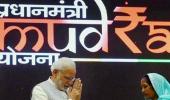By democratising access to finance, empowering women and marginalised groups, and adapting to India's diverse regional landscapes, PMMY has helped fortify the country's grassroots growth engines, says Chief Economic Advisor to the Government of India, V Anantha Nageswaran.

When the Pradhan Mantri Mudra Yojana (PMMY) was introduced on April 8, 2015, its mandate -- to “fund the unfunded” -- seemed deceptively simple.
Yet over the past decade, PMMY has reshaped India's credit landscape for micro and small entrepreneurs, extending collateral-free loans that have empowered millions to launch or expand businesses, improve household incomes, and fuel regional growth.
By December 2024, PMMY had disbursed over ₹31.3 trillion across 510 million loan accounts.
This scale reflects both the latent demand among microentrepreneurs and the willingness of lenders -- supported by the Credit Guarantee Fund for Micro Units -- to underwrite risk where collateral was absent. Crucially, more than 100 million of these accounts belong to first time borrowers, underscoring the scheme's catalytic role in seeding new ventures rather than merely refinancing existing ones.
From its inception, PMMY's tiered structure -- Shishu (up to ₹50,000), Kishore (₹50,000–₹5 lakh) and Tarun (₹5 lakh–₹10 lakh) -- allowed credit to grow with the enterprise.
The October 2024 introduction of Tarun Plus (₹10 lakh–20 lakh for repeat borrowers with strong repayment records) further rewarded credit discipline and enabled microenterprises to graduate into the small enterprise segment.
Over 10 years, the share of Shishu accounts fell from 92 per cent to 63 per cent, while Kishore and Tarun segments expanded, and average ticket sizes nearly doubled for Shishu and stabilised above ₹8 lakh for Tarun -- an evidence of maturing credit demand.
The evolution of sanctioned amounts mirrors this progression. In financial year FY 2015–16 (FY16), total sanctions stood at ₹1.37 trillion; by FY24, this figure had grown by 4 times to ₹5.41 trillion.
Importantly, the narrowing gap between sanctioned and disbursed amounts -- ₹5.41 trillion sanctioned versus ₹5.32 trillion disbursed by FY24 -- indicates operational efficiency in translating approvals into funds in borrower's hands.
On their part, Mudra borrowers have shown a good repayment track record with NPAs tapering at 3.4 per cent in FY24, down from 4.77 per cent in FY21.
PMMY metrics show a high degree of inclusivity. Women entrepreneurs accessed 69 per cent of all micro loans -- ₹13.8 trillion across 348 million accounts -- unlocking both economic and social gains at the household level.
Equally significant is the scheme's reach among historically underserved groups: ₹3.21 trillion to Scheduled Castes, ₹1.17 trillion to Scheduled Tribes, and ₹6.5 trillion to Other Backward Classes.
Reflecting these trends, a 2023 SBI Research report noted a 3.2-fold rise in India's Social Fabric Index, which tracks the participation of underprivileged communities in formal finance, between FY17 and FY22.
PMMY was instrumental to securing and insulating micro-entrepreneurs during the Covid-19 pandemic.
Under the Aatmanirbhar Bharat package, a 2 per cent interest subvention on Shishu loans -- amounting to ₹677 crore -- provided timely relief to the most vulnerable borrowers.
This countercyclical measure forestalled mass defaults, preserved livelihoods, and sustained consumer demand in local markets when incomes were under pressure.

State-level data further illustrate PMMY's pan India reach and the importance of local context.
Tripura leads with 86,320 Mudra accounts per 100,000 population, a testament to focused outreach in smaller states.
Karnataka (81,291), Tamil Nadu (80,480) and Odisha (79,973) showcase how mature MSME ecosystems and proactive state facilitation drive high penetration.
Assam's 36,623 accounts per 100,000 highlight successful financial inclusion in a region where access has traditionally lagged.
Meanwhile, populous states such as Bihar (56,803) and West Bengal (56,079) underscore the sheer volume of microentrepreneurs tapping into Mudra, even as their per capita figures point to opportunities for deeper market development.
Beyond numbers, the human stories behind Mudra loans are equally compelling.
In Kerala's village of Nilambur, Shishu loans enabled a woman's small mat business to successfully scale up 5 times and in turn has made her the financial backbone of the family.
In Punjab, Kishore loans allowed a man to support his family by setting up a car service station.
In Tamil Nadu, PMMY was instrumental in a woman's journey from being a daily wage worker to becoming owner of a floor mill which employs four persons.
These micro narratives exemplify how targeted credit can translate into tangible improvements in livelihoods and local economies, turning employees into successful entrepreneurs providing livelihoods for others. That is nation-building.
Looking ahead, PMMY's next decade should build on its accomplishments through targeted refinements.
A reasonable next step could be strengthening the role of Member Lending Institutions (MLIs) in supporting the long-term success of borrowers.
For beneficiaries with strong repayment track records, MLIs could offer structured handholding services -- such as business advisory, digital skilling, and linkages to market access platforms.
These interventions would not only improve repayment quality but also help borrowers transition from survival-mode enterprises to growth-oriented ventures.
Financial literacy, bookkeeping assistance, and guidance in navigating GST or formal registration processes could further assist micro-units in their scalability.
In its first decade, the Pradhan Mantri Mudra Yojana has demonstrated that well-designed, collateral-free credit can be a powerful catalyst for inclusive growth.
By democratising access to finance, empowering women and marginalised groups, and adapting to India's diverse regional landscapes, PMMY has helped fortify the country's grassroots growth engines.
Sustaining and enhancing PMMY's framework will be critical to ensuring that Amrit Kaal remains the promise of many, not the privilege of a few.
V Anantha Nageswaran is chief economic advisor to the Government of India.
Disclaimer: These are V Anantha Nageswaran's personal views.
Feature Presentation: Rajesh Alva/Rediff











